
The decathlon is a combined event in athletics consisting of ten track and field events. The word "decathlon" was formed, in analogy to the word "pentathlon", from Greek δέκα and ἄθλος. Events are held over two consecutive days and the winners are determined by the combined performance in all. Performance is judged on a points system in each event, not by the position achieved. The decathlon is contested mainly by male athletes, while female athletes typically compete in the heptathlon.

James Francis Thorpe was an American athlete and Olympic gold medalist. A member of the Sac and Fox Nation, Thorpe was the first Native American to win a gold medal for the United States in the Olympics. Considered one of the most versatile athletes of modern sports, he won two Olympic gold medals in the 1912 Summer Olympics. He also played football, professional baseball, and basketball.
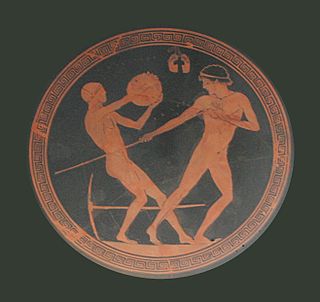
A pentathlon is a contest featuring five events. The name is derived from Greek: combining the words pente (five) and -athlon (competition). The first pentathlon was documented in Ancient Greece and was part of the Ancient Olympic Games. Five events were contested over one day for the Ancient Olympic pentathlon, starting with the long jump, javelin throwing, and discus throwing, followed by the stadion and wrestling. Pentathletes were considered to be among the most skilled athletes, and their training was often part of military service—each of the five events in the pentathlon was thought to be useful in war or battle.

Paavo Ilmari Yrjölä, also known as the Bear of Hämeenkyrö, was a Finnish track and field athlete who won the gold medal in the decathlon at the 1928 Summer Olympics. He also competed in shot put and high jump at the same Games, and in decathlon in 1924 and 1932, but less successfully.

Czech Republic competed at the 2004 Summer Olympics in Athens, Greece, from 13 to 29 August 2004. This was the nation's third appearance at the Summer Olympics after gaining its independence from the former Czechoslovakia. The Czech Olympic Committee sent the nation's largest team to the Games since the post-Czechoslovak era. A total of 142 athletes, 80 men and 62 women, competed in 19 sports; the nation's team size was roughly denser from Sydney by one sixth of the athletes. Women's basketball was the only team-based sport in which the Czech Republic had its representation at these Olympic Games. There was only a single competitor in equestrian, artistic and trampoline gymnastics, judo, and weightlifting.

Canada competed at the 1912 Summer Olympics in Stockholm, Sweden. 37 competitors, all men, took part in 30 events in 7 sports.

Francis Lawrence Lukeman, was a Canadian athlete. He was born in Montreal, Quebec.
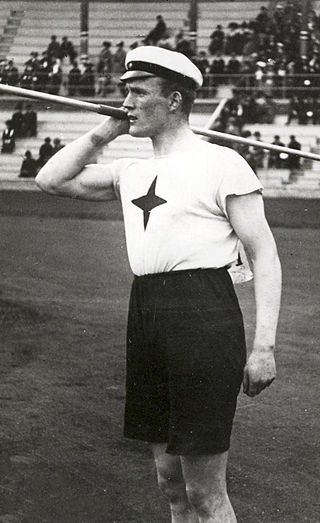
Karl Hugo Wieslander was a Swedish athlete. He set the inaugural world record in the pentathlon in Gothenburg in 1911 with a score of 5516 points. The following year he finished second in the decathlon at the 1912 Summer Olympics in Stockholm, 688 points behind Jim Thorpe. In 1913, after it was discovered that Thorpe had played semi-professional baseball for a minor league team, Thorpe was disqualified for not being an amateur. Wieslander was declared the winner of the 1912 Olympics event and awarded the gold medal, which he refused to accept. In 1982 Thorpe was reinstated by the IOC with Hugo Wieslander as joint winners of the 1912 Olympic decathlon. The IOC announced 15 July 2022 that Thorpe's gold medal had been reinstated and Wieslander, whose family had considered Thorpe the rightful winner, became the silver medalist.
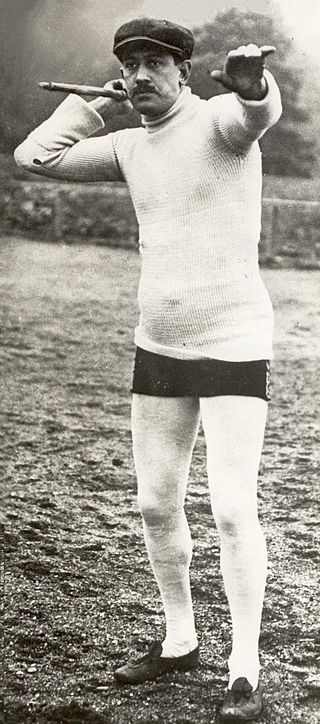
Eric Otto Valdemar Lemming was a Swedish track and field athlete who competed at the 1900, 1906, 1908 and 1912 Olympics in a wide variety of events, which mostly involved throwing and jumping. He had his best results in the javelin throw, which he won at the 1906–1912 Games, and in which he set multiple world records between 1899 and 1912. His last record, measured at 62.32 m, was ratified by the International Association of Athletics Federations as the first official world record.
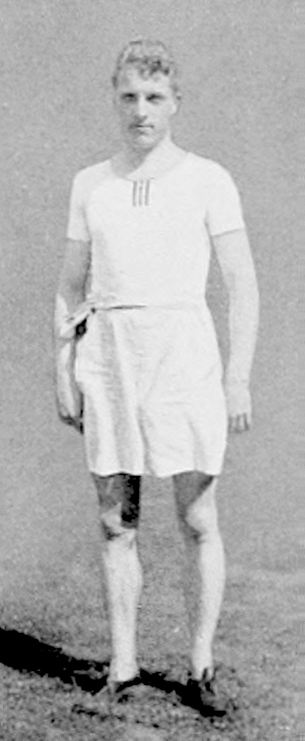
Ferdinand Reinhardt Bie was a Norwegian track and field athlete. At the 1912 Summer Olympics in Stockholm he won the silver medal in pentathlon. On winner Jim Thorpe's subsequent disqualification for having played semi-professional baseball in 1913, Bie was declared Olympic champion, but refused to accept the gold medal from the IOC. In 1982 Thorpe was reinstated as champion by the IOC; however, Bie was still listed as co-champion until the IOC announced 15 July 2022 that Thorpe's gold medal had been reinstated and Bie became the silver medalist.
James Joseph Donahue was an American athlete who competed mainly in the pentathlon. He competed in the pentathlon for the United States team during the 1912 Summer Olympics held in Stockholm, Sweden where he won the bronze medal. On winner Jim Thorpe's subsequent disqualification for playing semi-professional baseball in 1913, Donahue was declared vice-champion. In 1982 Thorpe was reinstated as champion by the IOC; however, Donahue was still to be considered vice-champion.

Sweden was the host nation for the 1912 Summer Olympics in Stockholm. 444 competitors, 421 men and 23 women, took part in 95 events in 16 sports.

Norway competed at the 1912 Summer Olympics in Stockholm, Sweden. 190 competitors, 188 men and 2 women, took part in 58 events in 14 sports.

Finland competed at the 1912 Summer Olympics in Stockholm, Sweden. The Grand Duchy of Finland was part of the Russian Empire at the time, but Finland's results are kept separate from those of Russia. In the Opening Ceremony Finland's team paraded under the national insignia flag of a Swedish-speaking female gymnastics club in Helsinki. 164 competitors, 162 men and 2 women, took part in 49 events in 10 sports.
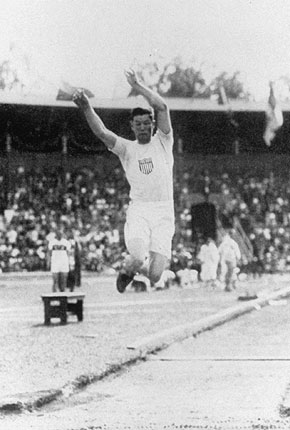
The men's decathlon was a track and field athletics event held as part of the athletics at the 1912 Summer Olympics programme. The competition was held from Saturday, July 13, 1912, to Monday, July 15, 1912. It was the first time the decathlon, which had been introduced in 1911, was held at the Olympics; a different ten-event competition, the all-around, had been contested in St. Louis in 1904. Twenty-nine decathletes from twelve nations competed. NOCs could enter up to 12 athletes.
The men's pentathlon was a track and field athletics event held as part of the Athletics at the 1912 Summer Olympics programme. It was the first time the event was held. Twenty-six athletes from 11 nations competed. NOCs could enter up to 12 athletes.

The javelin throw at the Summer Olympics is one of four track and field throwing events held at the multi-sport event. The men's javelin throw has been present on the Olympic athletics programme since 1908, being the last of the current throwing events to feature at the Olympics after the shot put, discus throw and hammer throw. The women's event was first contested at the 1932 Olympics, becoming the second women's throws event after the discus in 1928.

Combined events at the Summer Olympics have been contested in several formats at the multi-sport event. There are two combined track and field events in the current Olympic athletics programme: a men's decathlon and a women's heptathlon.




















